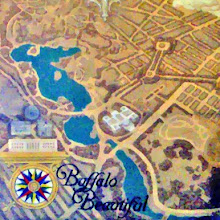
A recent article in The Buffalo News, citing a study of downtown parking, offers some interesting blog fodder. The Desman Associates study asserts that the parking situation in Buffalo is a mess, and requires better management.
The report recommends hiring a "parking czar" at $140,000 salary to consolidate parking management. As I recall, Desman previously produced studies in 2001 and 2006 which basically said the same thing, minus the "parking czar" baloney. The Buffalo News' take on the Desman study does get it generally right, however: "The dominant theme in the report is that too many entities are involved in city parking, creating 'shortsighted' and disjointed management."
This much is true. But one quote in particular stands out: "'Downtown can’t begin to compete with suburban office parks without convenient and affordable parking,' said Schmand, whose nonprofit agency represents the interests of downtown stakeholders and residents."
To the uninitiated, this may sound reasonable, except for one thing. Downtown can never compete with suburban office parks on the basis of convenient and affordable parking. To compete successfully on that basis would mean the destruction of all of downtown's remaining (and emerging) value.
By definition, downtown can never out-compete the suburbs on suburban, automobile-based terms. By necessity, parking takes up a tremendous amount of land, creating lots of dead, open space, which the suburbs have plenty of. In fact, that's the suburbs' main asset: lots of open space. A city's main amenity is not open land, but density, walkability, a diverse mix of uses, and the quality of the streets and other public spaces. These are the areas in which the suburbs cannot out-compete downtown. These are things cities like Buffalo need to focus on to be successful.
So, if it is evident that an urban environment can never offer as good a "suburban product" as the suburbs can, then why do we continue to play that game? Clearly, the prevailing value system is upside-down. The city's current strategy is irreconcilable with what downtown currently is, and what the community wants it to become. We've got to find a way to break out of this vicious cycle and change this self-defeating paradigm. This requires leadership.
If anything, this simply demonstrates how shortsighted and incoherent our public discussion has become on such issues. If city leaders think that parking is the main asset—and don't recognize the many natural urban advantages downtown has over the suburbs—then the whole exercise is guaranteed to fail. This strategy will simply end-up undermining the value of the city, leading to a dead downtown like the one we've got. Like many other mangled cities, we've been trying this strategy for decades and failing, as the condition of our downtown attests. We can't keep playing this self-defeating game. Who has the guts to finally stand up and stop this nonsense?
Also, there's my old saying, which I've oft repeated: Like all cities, we really have one essential choice; we can have a vibrant downtown where everyone complains about parking, or we can have a dead downtown where everyone complains about parking. If you think about it, that's the only choice. Really.
For years, I’ve been involved with The New Millennium Group, a local community activist organization dedicated to progressive planning, economic development, and revitalization. In 2003, NMG did a downtown parking survey that showed over 50% of the land area of downtown Buffalo dedicated to surface parking (see graphic).
In the six years since, the city situation regarding parking, planning, and transportation hasn't really changed. So to repeat NMG’s original take on the issue: Buffalo doesn't have a parking problem, it has a parking management problem. (In truth, it's a transportation management problem, but that's a topic for another post.)
The fresh angle is this: the city doesn't need to add another high-priced manager and yet another layer of bureaucracy. We can get much better management of downtown transportation/parking assets if we better utilize the resources we've already got. Private companies routinely reorganize management structures to adapt to changing conditions, so why can't the city? We've already got a planning department that studies and understands these issues (and the many related issues, too) and has the expertise to effectively manage parking by putting it in its proper context—which is the problem to begin with.





